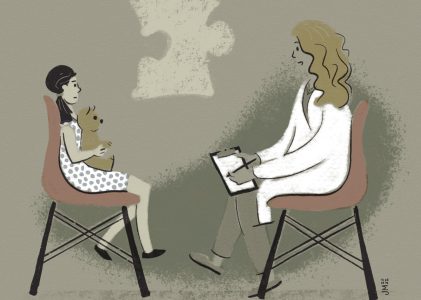Early intervention is helpful for many children with autism. Read on to see if your child shows signs of autism and might benefit from testing.
What is autism spectrum disorder?
Autism, or autism spectrum disorder (ASD), is a complex developmental condition that affects social skills, communication and behavior. People with ASD may communicate, behave, interact and learn in ways that are different from neurotypical people. The CDC estimates that about 1 in 44 children have been diagnosed with autism.

Autism is known as a “spectrum” disorder because the abilities of people with ASD vary widely. Some people require lots of help with daily tasks while others can work and live on their own. Some people show clear signs of autism from a very young age while others experience subtle symptoms that go unnoticed into adulthood.
No matter how mild or severe, ASD symptoms start before a child is 3 years old. Some children show signs of autism before their first birthday, while others show signs at age 2 years or later. Some children meet developmental milestones until around 18-24 months of age and then stop gaining new skills or lose the skills they once had. These symptoms may persist throughout a child’s lifetime or get better over time.
This variability can make it difficult to tell whether a child’s development is on track. As parents and caregivers, it is essential that we learn the signs of autism and monitor our children for these indicators.
Signs of autism spectrum disorder
Look out for these age-related milestones in your young child:
By 9 months of age
- Avoids or doesn’t hold eye contact with you
- Doesn’t respond when you call their name
- Doesn’t show big facial expressions like surprised, happy, angry, or sad
By 12 months
- Doesn’t play pat-a-cake or other simple interactive games
- Uses few or no gestures like waving goodbye
By 15 – 24 months
- Doesn’t show you an object they like or share other interests with you by 15 months
- Doesn’t point to show you something interesting by 18 months
- Doesn’t notice when others feel upset or hurt by 24 months
- Struggles with speech and/or language delays
- Displays unique sensitivity to noise or touch
By 3 – 5 years of age
- Doesn’t notice other children and join them in play by 3 years
- Doesn’t engage in pretend play, like pretending to be a superhero or teacher, by 4 years
- Doesn’t sing, dance or act for you by 5 years
- Experiences meltdown behaviors that are frequent and last more than 20 minutes
- Continues to struggle with potty training
An older child may show:
- Unusual ways of communicating and relating to other people, such as:
- Tending not to look at or listen to people
- Having trouble with the back and forth of conversation
- Often talking at length about a favorite subject without noticing that others aren’t interested or without giving others a chance to respond
- Using facial expressions, movements, and gestures that don’t match what they’re saying
- Speaking in an unusual tone of voice that may sound sing-song or flat and robot-like
- Having trouble understanding another person’s point of view or being unable to predict or understand other people’s actions
- Repetitive behaviors or restricted interests, such as:
- Repeating words or phrases, flapping their hands, rocking their body, spinning in circles, or showing other repetitive behaviors
- Having a persistent and intense interest in specific topics like numbers, facts or details
- Focusing on parts of objects, such as the wheels of a car
- Being highly sensitive to the way things sound, smell, taste, look or feel
- Being especially dependent upon routines or particular ways of doing things. For example:
- Your child may become very upset if dinner starts a little later than usual or you drive home from school a different way.
- Your child might insist on playing with toys the same way every time or become upset when objects are moved “out of order.”
It is important to note that children with autism won’t necessarily show all of these signs, and many children without autism will show a few of these signs. Consequently, a professional evaluation is crucial to receive an accurate diagnosis.
Who should get tested for autism?
If your child scores up on the M-CHAT (Modified Checklist for Autism in Toddlers) at their 18-month or 24-month visits to their pediatrician, they should meet with a psychologist for further assessment.
The M-CHAT is a useful screening tool, but it doesn’t detect all cases of autism. Some children pass the checklist but later receive an autism diagnosis. If your child’s behavior or development concerns you, your child may need comprehensive autism testing, regardless of prior M-CHAT scores.
Why get tested for autism?
An accurate diagnosis is essential for planning the best course of treatment. The earlier treatment for ASD begins, the more likely it is to improve your child’s social skills, communication skills and behavior issues.
What is an evaluation for autism like?
Typically, you and your child will go to a behavioral health clinic or another controlled setting to meet with a psychologist specially trained to diagnose autism spectrum disorder. The psychologist will interview you about family history, your child’s development, and your child’s current behavior issues. The psychologist and their clinical assistants will observe your child engaging in different activities and administer structured tests with them. You will also fill out questionnaires about your child. The evaluation generally lasts three hours for children under five years old and up to six hours for older children. For some children, it’s helpful to break up longer evaluations into two sessions.
What happens after the autism evaluation?
After you leave the appointment, the psychologist will score and interpret the tests administered during the evaluation and write up their findings and recommendations in a report. You will receive a copy of this report and then meet with the psychologist to go over their findings and discuss any questions or concerns that you have. You will also discuss treatment recommendations and resources for additional information and support.
What will I learn about my child from an autism evaluation?
A comprehensive evaluation will give you a better understanding of your child’s unique strengths and challenges and how to help them perform better at school, at home, and in other important areas of their lives. You will also learn about therapeutic and educational resources that may be available to them.
Next steps
If you are concerned that your child may have autism spectrum disorder, talk to your child’s primary care doctor or call us at Athena Care. We will help you determine whether your child could benefit from a comprehensive evaluation for autism. We offer a full range of assessment services and our clinicians are trained and experienced in diagnosing autism. We also accept payment from most major health insurance carriers. Call us today, and one of our friendly associates will walk you through the process, check your insurance coverage and get you headed in a better direction.

Rachel Swan, MS
Editor
Rachel has a Masters of Science in Clinical Psychology from Vanderbilt University, where she spent 16 years as a Research Analyst in the Psychology and Human Development Department.


